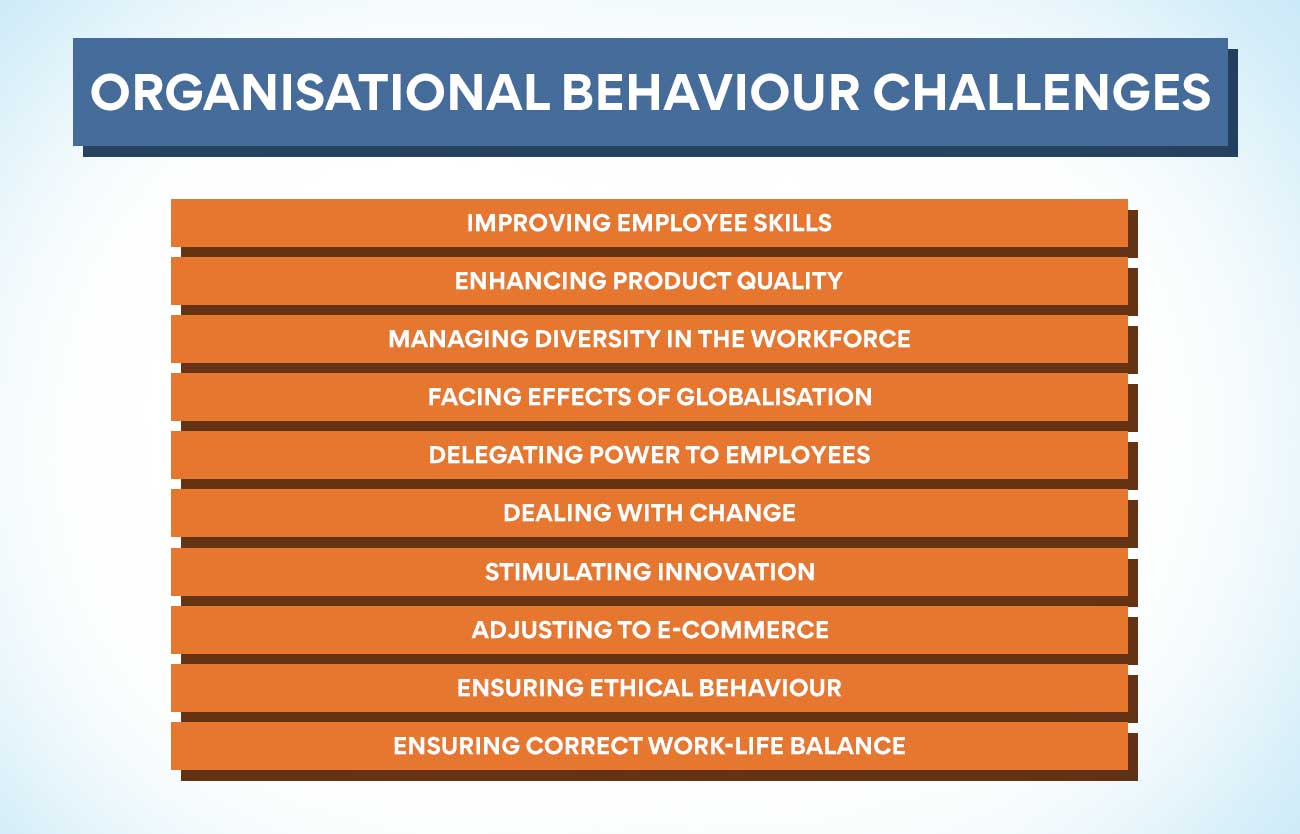An organisation works and progresses due to the efforts of the human workforce in it. Without the positive contribution of its employees, no company can hope to survive and grow. But these staff members belong to different social, economic and educational backgrounds; hence, they can behave in different ways inside the company. The management must understand their behaviour and ensure that it helps the firm grow. The HR managers try to understand what organisational behaviour challenges are and how to overcome them to use the employees’ full potential.
The study of employees and how they act inside the company is one of the main subjects you learn in the Post Graduate Certificate Course In Human Resource Management. You can get more details about this course on our website.
What Is Organisational Behaviour?
Organisational behaviour is a subject dealing with the behaviour of the employees inside the company. Knowing how people inside a firm interact with each other helps the HR department devise training methods to improve their performance. Organisational behaviour considers various aspects of employees like their genders, race and work specialisation. This study helps the management understand how teams work and interact. It also helps them know how this interaction contributes to the company’s progress and what improvements can be made. The HR teams also learn what organisational behaviour challenges are and how they can find the right solutions.
Organisational behaviour studies also help employees understand their individual goals and the factors that affect them. Companies need to study this as it helps them overcome cultural differences between employees and improve productivity. It also enables the firm to recruit people most suited to its culture. Knowing the workers’ behaviour also helps managers know what jobs can be delegated to different people. Although it may vary from company to company, certain advantages are common to most establishments. Most of the organisational behaviour challenges are also found to be present in most firms.
The Objectives Of Organisational Behaviour
Studying people’s behaviour in a company helps the company achieve various goals.
- Finding the right employees
- Improving job satisfaction
- Knowing the workers in a better way
- Developing a unique company culture
- Creating a productive team
- Developing strong leaders in the company
- Increasing the productivity of employees
- Promoting innovation
- Ensuring ethical behaviour
- Creating a positive work environment
The Elements Of Organisational Behaviour
Before looking at what organisational behaviour challenges are, one must understand the various elements included in this study. These elements are interconnected, and each could influence people’s behaviour in an organisation.
People
Employees are the main component in the study because they are the ones who can affect the combined corporate culture of a company. They are mainly responsible for a company’s progress and contribute greatly to achieving corporate goals. It is highly essential to understand the changes they undergo due to various other external factors. Understanding the people thoroughly can help HR managers develop the right solutions to improve their performance and productivity.
Structure
The organisational structure of a company is very important. There must be robust management to ensure that systems are enforced and work happens as needed. Strong management also helps to ensure coordination between the different departments in the firm. A proper management structure also is necessary to take care of the needs of the employees. It ensures the proper flow of control and makes sure that the organisational culture is maintained.
Technology
Technology has a great impact on organisational behaviour. It can do good or harm to a company. It is essential to understand how a company’s employees treat technology and use it. If used properly, modern technology can help people complete their tasks quickly and without much effort. Implementing the latest technologies can result in innovative solutions. But the wrong usage or lack of knowledge of modern gadgets and their working can greatly reduce productivity and create resistance among employees.
Environment
The office environment has a great impact on the performance of employees. It influences the behaviour of employees and how they interact with each other. A healthy workplace builds morale and confidence. It can also spur innovative thoughts, whereas a toxic environment can produce negative thoughts and stop new ideas from forming. While a good office environment makes employees happy and increases their enthusiasm to work, a toxic workplace can dampen their spirits greatly.
How Does The Study Of Organisational Behaviour Help Managers?
Promote Positive Behaviour
Positive behaviour is essential for the smooth functioning of any organisation. The study of organisational behaviour helps managers identify those who are positive and encourage such people. Such employees will benefit the firm and influence other workers to have positive thoughts. Managers can also discourage negative behaviour and thus prevent mistrust among staff members.
Create A Positive Workplace
A positive workplace culture is essential for companies to progress. Most new employees don’t come with a positive mindset. Using organisational behaviour theories, managers can induce positive thoughts into the minds of new workers. They can also use the principles of this study to identify such people and use them to guide and influence new staff members. It will result in the creation of a positive workplace and avoid selfishness and negative behaviour.
Also Read: What Is The Meaning Of Strategic Direction In HRM?
Promote Prosocial Behaviour
Studying organisational behaviour principles helps managers promote prosocial behaviour among employees. The study teaches them tools and methods they can employ on the staff members. Motivational tools help leaders understand the differences between employees and to promote interaction that overcomes such differences. Such a social approach to other staff members improves productivity.
Identify Antisocial Behaviour
A few organisational behaviour challenges are related to the negative behaviour of certain employees. Such toxic behaviour can affect the other employee and, consequently, the company. Organisational behaviour helps managers to identify such people and take necessary action. They can also find solutions for such issues and implement them immediately. It saves the company from the ill effects of negative thoughts by a few employees.
Predict Response To Changes
Changes are necessary for any organisation. These can happen due to the introduction of new technology or the restructuring of people. Managers must know what effect such changes will have on employees. Predicting their reactions will help the leaders prevent any negative fallout of such changes. They will also be able to create the right strategy for implementing changes in the company.
You can learn more about how you can use organisational behaviour to your benefit in the Post Graduate Certificate Course In Human Resource Management offered by reputed institutions. The complete details of this course are available on our website.
Organisational Behaviour Challenges

- Improving Employee Skills
Technology is changing so fast it is difficult even for experts to keep up with it. Employees already busy with regular work may need help updating themselves to the latest technologies. They must acquire new skills to handle such modern developments to contribute to the company’s success. They will also be left out of the race for higher positions. When you check what organisational behaviour challenges are the ones that HR managers must overcome, you can say that upskilling is at the top of the list.
- Enhancing Product Quality
Keeping up with customers’ demand for higher quality is not easy. There are various parameters like performance, features, reliability, durability, service, reputation, etc., based on which customers assess the quality of a product. Employees must be aware of these parameters and must ensure that they incorporate the best quality in the products they make. Managers must make sure that staff members at all levels understand the importance of maintaining the highest level of quality for all items made in the company. They must implement programmes like total quality management and reengineering programmes that require the employees’ complete cooperation.
- Managing Diversity In The Workforce
The company must maintain diversity in their workforce. This greatly improves their branding as an employer. It also helps the company harness the innovativeness of different sections of people and benefit from the synergetic effect of a diverse workforce. But it is not easy managing a workforce that has people from vastly different social, economic and educational backgrounds. The management must strive to make sure that everyone accepts people of all types and creates a harmonious working environment. They must also put special efforts into preventing conflicts that can naturally occur in such a diverse staff.
- Facing Effects Of Globalisation
Globalisation is a phenomenon that affects all organisations. The competition is tougher, and companies have to reach out to customers irrespective of location. They must expand their operations to new territories with unknown challenges. The terrain, climatic conditions and people will be different, and this poses a great challenge in running a company in remote locations. Managers must prepare to lead people who are different from what they are used to. They must also work in places outside their home country. These are great challenges that managers must overcome.
- Delegating Power To Employees
More companies are now delegating power to lower-level employees. They are given the freedom to decide on various aspects like their schedules, operations, procedures and problem-solving methods. Encouraging workers to participate in the decision-making process greatly increases their commitment to work. By giving them freedom, managers expect a good amount of ownership in workers. While this will allow the managers much more time for more serious issues, it also changes the equation between the manager and the subordinate. Everyone must be prepared for this changed scenario and work towards the growth of the firm.
Also Read: What are HR Analytics and Metrics?
- Dealing With Change
Gone are the days when markets remained constant for a long time. It was not often that disruptions happened in the market. When you look at what the organisational behaviour challenges are, it is evident that dealing with the change in work processes is a major one. As the market keeps changing, there is a need to improve processes and product quality. It means that employees will not be doing the same job for too long a period. They must be prepared to change their working styles and learn new skills to ensure the company’s survival.
- Stimulating Innovation
Companies must be innovative if they want to beat the competition and stay at the front. But it is not easy to be innovative. This needs a lot of adjustments by the employees, who must be flexible to adopt the latest technologies. They must constantly upskill themselves and bring out innovative products. Encouraging employees to innovate continuously is surely a challenge manager must overcome.
- Adjusting To E-Commerce
E-commerce is the name of the game now. Unless companies can sell their products effectively online, it is difficult for them to survive. More and more customers prefer the online route to buy their needs as it is easy and saves a lot of time. It is not easy for companies to shift from traditional selling methods to online selling. They must get their employees to train for online sales and transactions.
- Ensuring Ethical Behaviour
The workplace consists of people from different backgrounds, and it is not easy for managers to know how many of them belief in ethical practices. But companies cannot afford to encourage unethical practices, or otherwise, it will damage their reputation forever. Managers must strive to coach employees on the right conduct to complete their tasks.
- Ensuring Correct Work-Life Balance
Employees must be able to balance their work and personal life. It is not easy, considering that they must spend more time and effort to move forward in their careers. It is the responsibility of HR managers to train employees to balance their personal and professional lives.
We have seen what organisational behaviour challenges are and how they impact the functioning of a company. You can learn about overcoming these challenges in the Post Graduate Certificate Course In Human Resource Management offered by reputed institutions. More details about this course are available on our website.
Conclusion
There is no doubt that employees are the most important assets of a company, and managers must do their best to keep them happy and enthusiastic. But it is not easy considering the diversity in the workforce and the various pressures they face at the office and home. Using organisational behaviour studies can help leaders greatly in understanding employee problems and providing ideal solutions for them. All HR managers must study the subject deeply and use them in their professional life.
More Information:
HR Analytics: What Is It and How To Use It?
Top 21 Human Resource Interview Ques & How To Ans Them




























